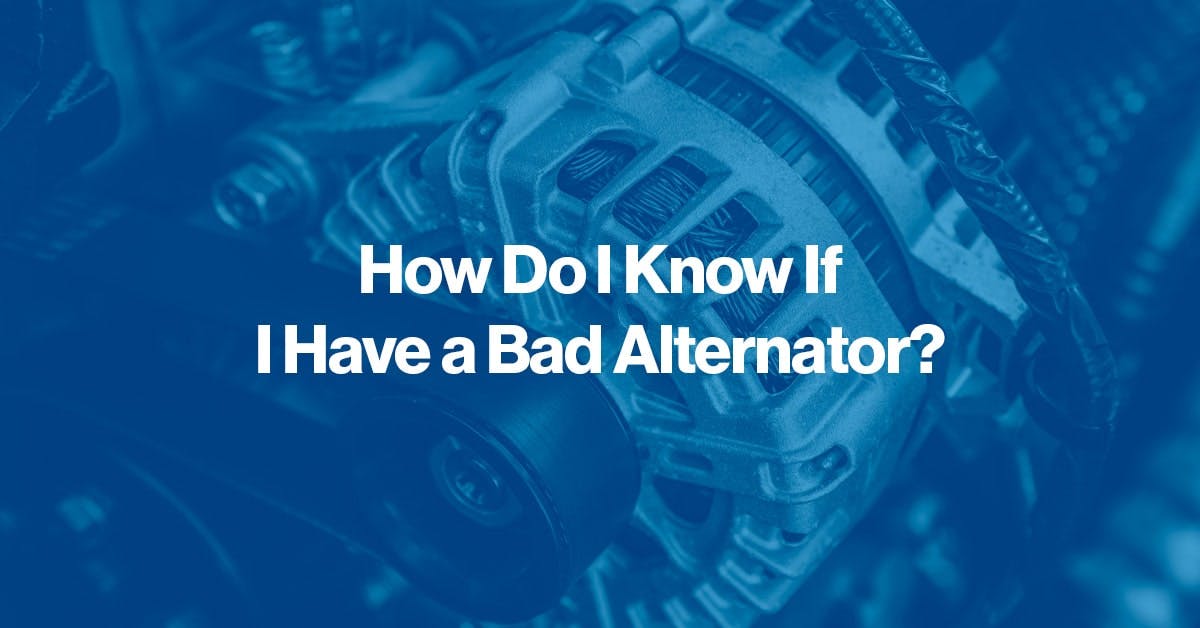Your alternator is an important piece of your car's make-up.
Without it, you wouln't be able to run your car.
In this article you will learn how to identify issues with your alternator, and what is causing them.
Page Contents
What Are the Signs of a Bad Alternator?
Since the alternator is such an important part of your car’s electrical system, it is important that you know the signs that your alternator is failing. Here are some of the signs of a bad alternator:
Warning Dash Light
One of the most obvious signs of a bad alternator is the light on your dashboard that shows issues with the battery or the alternator.
The light looks like a small orange battery with a plus and minus symbol in the middle.
Some newer cars actually have an ‘ALT’ light to signify it is the alternator causing the problem.
If you see this warning light, you’ll want to rule out that is it not the battery causing the issue before you look at the alternator – ensure it is not flat or damaged in any way.
Dead Battery
If the battery is dead for seemingly no reason, this can indicate that your alternator isn’t working as it should.
When the alternator fails, it is no longer charging the battery as you drive, meaning the next time you go to drive you may be unable to start your car.
Of course, car batteries do have a lifespan,so ensure it isn’t just time for a new battery before you blame the alternator.
Jump start your car.
If the car stays running, take this as a warning sign to get your battery replaced.
If the car starts, and then the battery dies shortly afterwards, it’s time to get the alternator looked at.
Overly Bright Or Dim Lights
You may notice that your headlights or interior lights begin to flicker or dim, or even appear brighter than before.
This happens because when the alternator is failing, it is delivering an inconsistent voltage to your lights, causing them to flicker or malfunction.
It could also be that one of the connections in your alternator has come loose or is flowing through the wrong outlet.
Have someone take a look at your alternator to ensure everything is in the right place.
Slow Electrical Accessories
If your electrical accessories aren’t receiving the correct voltage they need to work, they may malfunction or work slower than usual.
This could be that you notice your sunroof or your electric windows are much slower than usual, or even your speedometer starts playing up.
If you notice this, it is worth getting your alternator checked out at a garage.
Many cars are wired so that if there is an issue, these components will lose power before your headlights do.
While this is primarily a safety feature, it can work as a good warning sign to get things sorted before you’re left with a car that won’t work at all.
Trouble Starting Or Frequent Stalling
We’ve all had that feeling of dread in the pit of our stomachs when you turn the key in the ignition, and you’re greeted with a ticking noise rather than the roar of the engine.
This can be another sign that your alternator has failed to charge the battery.
And while we all stall every now and again, stalling more than usual can be an indication that there is an issue with the spark plugs in the alternator.
If they’re not getting enough power, they won’t be able to keep the engine running – hence the stalling.
Strange Noises
Cars make a variety of noises, but if you sound something that doesn’t sound right, trust your instinct, and get it looked at.
A growling or whining noise could be coming from the alternator’s serpentine belt. If it has come loose, misaligned, or snapped, it could be responsible for the noise.
If the belt isn’t spinning the rotor properly, the alternator will not be able to produce the electricity needed to keep the car functioning correctly. Have a mechanic look at your serpentine belt to decide if it needs fixing or replacing.
Burning Smells
Rubber, plastic, oil – chances are you’ve smelled burning from a car before.
More often than not, it can indicate a problem.
The inner workings of your car get very hot, and your alternator is no different – if you can smell burning rubber, it may be because your serpentine belt is worn out.
If you smell burning plastic, it could be down to an overheating spark plug. You have to be particularly careful with burning smells – ignoring them could result in an engine fire.
Don’t put off booking into a garage today.
What Causes These Issues?
So, you’ve identified the symptoms of a bad alternator, but what causes them?
There are several reasons your alternator may fail.
The End Of Its Life
Like all car parts, your car alternator will only last a certain amount of time before it needs replacing.
The average car alternator will last anywhere between 5 and 8 years.
If you are noticing some issues and it has been more than five years since you had your alternator looked at, it may be time to think about replacing it.
Bad Wiring
There are two different sets of wiring inside an alternator: the set around the rotor, and the set attached to the stator.
If any of these wires are damaged, you could end up having an electrical short, or a malfunction.
Wire damage could come from corrosion, or simply coming loose over time.
A mechanic will use a voltmeter to test the output from your battery to determine if your alternator is working correctly.
Blown Fuse
If your car experiences a power surge – when the voltage passes 170 volts – it can cause issues with your fuses and spark plugs.
A blown fuse is a fairly simple repair, the mechanic will replace the broken fuse with a new one and things should be back to normal.
Broken Serpentine Belt
Your belt is put under a lot of pressure and friction, so over time, it will become worn and damaged.
It may snap, or slowly deteriorate due to the high temperatures under the bonnet.
If this is the case, you may just need the belt replaced, which means your alternator will be okay for a few more years.
Issues With The Computer System
If your car is fairly new, it will have an ECU – and electrical control unit – that is responsible for virtually managing the different electrical components in the vehicle.
Your issue with your alternator could be that the computer has glitched, and it isn’t working how it is supposed to.
Extreme Temperatures and Debris
A harder-to-avoid reason your alternator may fail could be down to the change in temperature.
As mentioned before, under the bonnet can get extremely hot.
This puts strain on the belts and bearings, especially if the weather is warm.
Any dust or debris that manages to find its way inside your engine – and it does, somehow – could affect the alternator.
Ensure there is nothing such as grime, leaves, or other debris coating your alternator before you try to diagnose the issue.
What Is an Alternator?
Your alternator is the component of your car that is responsible for delivering electricity to the parts of your vehicle that run off electricity.
When you drive, the car uses mechanical energy to generate electricity.
This is how it manages to power the electrical components, as well as charge your battery.
What Does It Do, and How Does It Work?
First and foremost, the alternator charges your battery whilst you drive. Without it, you would have to plug your car in to charge – like an electric vehicle.
The alternator is also responsible for powering the electric-ran elements of your car, such as your electric windows, the headlights and interior lights, the radio, and the heating and cooling systems.
The alternator works on a system of a belt and a crankshaft working together.
As the serpentine belt moves, it spins a rotor, which produces electricity from mechanical energy.
Where Can I Get My Alternator Looked at?
If your alternator is showing any of these symptoms, you should look into taking it to a garage sooner rather than later.
If you ignore the problem, it will only get worse and could end up costing you more money.
Here at BookMyGarage, we put you in touch with the best garages in your local area, for the best possible price. Just enter your reg plate and postcode and click to compare prices.
Join 5 million happy drivers that have saved money on their repairs today!






